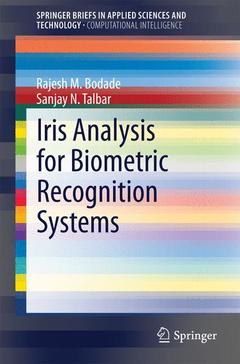Iris Analysis for Biometric Recognition Systems, 2014 SpringerBriefs in Computational Intelligence Series
Auteurs : Bodade Rajesh M., Talbar Sanjay N.

Introduction to Iris Recognition.- Related Work.- Iris Segmentation.- Iris Recognition using Dual Tree Complex Wavelet Transform and Rotated Complex Wavelet Filters.- Conclusion and Future Scope.
Rajesh M. Bodade is currently working as Associate Professor in Faculty of Communication Engineering at Military College of Telecommunication Engineering, Mhow, Indore, India. He completed his PhD in Electronics and Telecommunication Engineering (Iris Analysis for Biometric Recognition System) from SRTM University, Nanded, India in 2011. Dr. Bodade has more than 20 years of teaching experience. He received “Chief of Army Staff Medal and Commendation” and “General Officer Command in Chief-Army Training Command Medal and Commendation” on 26 January 2011 and 15 August 2013, respectively, for his outstanding contribution in teaching and research at MCTE, Mhow. He has also published several papers/articles in National and International peer-reviewed journals and Conference Proceedings. He has published over 20 papers in refereed Journals and National/International Conferences of repute. He is the Life member of Indian Society for Technical Education, Institution of Engineers (India) andFellow of IETE. His research interests include signal processing, pattern recognition, biometrics, SDR and cognitive radio.
Sanjay N. Talbar is a Professor in the Department of Electronics and Telecommunication Engineering, Shri Guru Gobind Singhji Institute of Engineering and Technology, Nanded, India. He received B.E. and M.E. degrees from SGGS Institute of Technology, Nanded, India in 1985 and 1990, respectively. He obtained his PhD from SRTM University, Nanded, India in 2000. He received the “Young Scientist Award” by URSI, Italy in 2003. He has published 10 books, 50+ papers in refereed Journals and more than 120 papers in National and International Conferences. He has guided about 70 students for dissertation at M.E./M.Tech. and supervised 10 students for PhD and additional research scholars are working towards their PhD. He is a member of various prestigious academic committees. He is a member of IET (UK), life member of Indian Society for Technical Education (ISTE) and Fe
Date de parution : 05-2014
Ouvrage de 109 p.
15.5x23.5 cm



